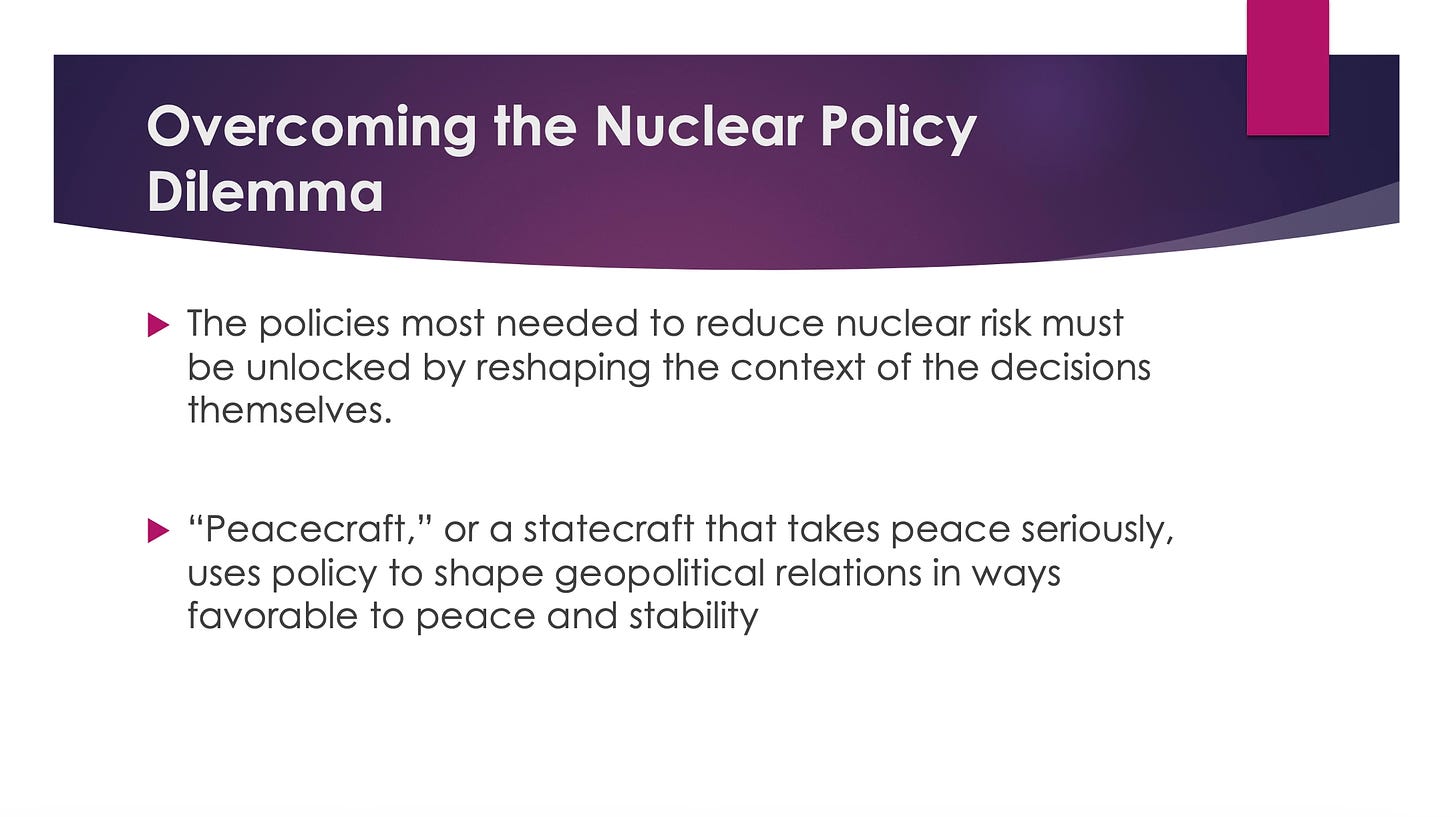We’re living in a world where policymakers are playing Russian roulette with our lives and calling it “stability.” We need to think differently about nukes and the risks of war. Specifically, we need to recognize that the projects of peacemaking and nuclear stability are fundamentally linked.
Peace advocates rightly abhor nuclear weapons, but tend to simply refuse the various concepts that occupy the nuke-bro imaginary. Although I totally get it and sympathize, those nuke-bro concepts are a language spoken by people wielding power. Deployed and critiqued the right way, they can have instrumental value on the path to disarmament, as long as they’re not venerated or treated as sacrosanct.
Nuclear policy analysts, in turn, make assumptions about the world that no reasonable person should make. Worse, they never—never—try to achieve anything with their advice more ambitious than perpetuating a nuclear stability that holds at risk the lives of countless innocents without consent.
There is no firmer foundation for nuclear stability than a peaceful situation, and there is no project of peacemaking that can leave untouched a government’s nuclear strategy. Peace and stability necessarily converge.
The Nuclear Policy Dilemma
We’re living with an ambient level of risk that is growing, that policymakers are insufficiently sensitive to, and that affect so many people in so many nations that nobody—nobody—has a right to play with it. Anyone with power has a responsibility to reduce—not simply manage—the nuclear risk plaguing humanity.
But traditional thinking about nuclear policy is nothing more than management, and it has only brought us to this moment, on the verge of nuclear precarity.
Policies oriented toward increased, stronger, or enhanced deterrence are making the world less secure. Most of the time when national security bros are talking about “deterrence,” they’re making a category error, talking about militarism but legitimizing it by calling it “deterrence.”

In a world facing compounding nuclear risks, accelerating militarization, and chauvinistic rhetoric, reasonable people know something must be done. Yet, if you turn to the nuclear policy community for advice (no offense if that’s you), what you get is prescriptions for minor policies of modest ambition that seek only to manage our profoundly absurd system of existential violence. That’s not good enough.
The nuclear policy dilemma is thus this logical trap that we find ourselves in—folks give policy advice about what to do about nuclear risk but only in relation to establishing “guardrails” on a nuclear status quo that is utterly out of control, beyond accountability, and that sits on at best questionable intellectual foundations.
Peacecraft and Relational Totality
It’s understandable how we ended up in this trap.
If you think nuclear wars are winnable; if you think deterrence is a stable foundation for co-existence; or if you think an adversary’s intentions are permanently inscrutable…well, then you’re always going to hoard power and reason within a deterrence framework. The rejoinder, “Yeah, but deterrence…” will always clip your ambitions and funnel your policy advice into reasonable but trivial ideas like nuclear dialogues and hot lines while the US spends upwards of $1.7 trillion dollars on a nuclear modernization binge that its enemies have little choice but to emulate, albeit with proportionally lower levels of investment.
Look at what the nuclear policy dilemma—prescribing modest means in pursuit of grand, existential ends—has gotten us. It’s paved the way to nuclear precarity. We end up in a situation like North Korea 2017. I find that unacceptable. I think normal people find that unacceptable. And that means we have to break out of the dilemma.
And this leads to the underlying idea in how I think about nuclear risk reduction, which can be summarized simply as “peacecraft.”
In statecraft, you don’t think about individual policy choices; you orchestrate them. The merits of one decision—troop presence on some island, a diplomatic agreement with so and so, development assistance for this or that country—are part of a semi-coherent whole. You cannot evaluate one policy choice by looking at it in isolation, because the answer to whether the choice is worthwhile requires you to take into account all the other choices.
Peacecraft is much the same as statecraft, then, but aimed at a security worthy of the name—and therefore it aims at the root sources of insecurity, which are everywhere political and relational. Any individual policy choice ought to have in mind the larger purpose of state policy—peace itself.
This is more radical (in a good way) than it might sound.
In practical terms, peacecraft necessarily means aiming your policy less at your enemy or some other actor out there in the world. Instead, you target policy at the context within which you and your enemies exist together—change the frame of the decision, not just the decision itself. And to do that means taking seriously the ways your choices are bound up with systems of insecurity that threaten you and your people. Narratives of exceptionalism or nationalist chauvinism have no place in peacecraft.
We are trained to think about nuclear coercion in reductive, reductionist ways. We isolate variables. We decontextualize our analysis of those variables. Philosophically, I get it—I was trained that way too. We create simplifying constructs to make better sense of a complicated world.
But the more we do that, the more we get away from life as it actually exists. Policymakers sit within the full field of forces that define our messy complex reality. Our advice-giving analysis should reflect that to the extent possible. Social totalities—not reductivism—better approximates reality. And when we think in terms of the totalizing context in which policymakers take decisions, the crucial thing shaping those decisions is the overall valence of geopolitical relations.
We must think about relational totality, and aim policy advice at it.
The valence of the relational context—net negative, net positive, something in between—is what usually determines which policies are possible or impossible, what makes sense, what doesn’t make sense.
And so we have to manipulate policy not just to directly affect nuclear risk through nuclear policy…we have to unlock the arms control and disarmament policies that would be most stabilizing, most impactful, most transformative…and unlocking those means first using policy to shape the relational context that frames a policy choice.
By shifting the valence of geopolitical relations, we create a new, more enlightened commonsense. We marginalize bloodthirsty jingoes and phallically insecure missile lovers. And we move closer to a security worthy of the name, which is to say peace.
A version of this article is cross-posted at Van’s Un-Diplomatic Newsletter.


0 Comments